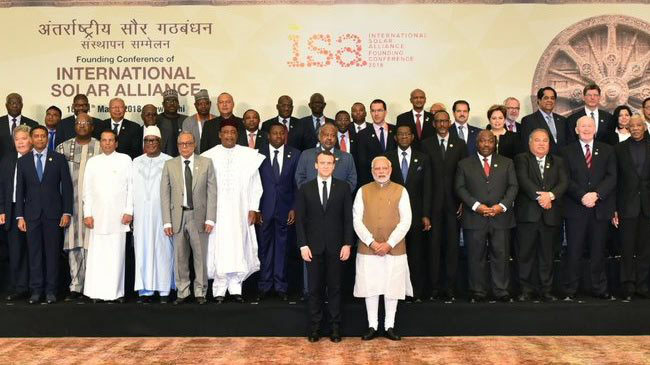President David Granger has called for sun-rich states such as Guyana to have access to the necessary solar technologies.
The President was speaking on Sunday in New Delhi, India at the International Solar Alliance (ISA) Founding Conference and Solar Summit.
According to a release from the Ministry of the Presidency, he also urged the international body to ensure that small states benefit from investment, innovative technologies, photovoltaic infrastructure, information-sharing and the dissemination of scientific and technological data.
He said that Guyana’s ‘green’ development thrust is not only about environmental and economic security, but that it is also about energy security.
“Its [Guyana’s] strategic location in the Tropic of Cancer, and a mere 6.8 degrees north of the Equator, makes it suited for solar energy generation. It enjoys an average of 12 hours of daylight, all year round, with consistently high levels of solar insolation,” he said.
He also told the high-level forum that Guyana’s low population density of 3.5 persons per km2 and the fact that many of its hinterland communities are small and isolated make solar energy a necessary response.
“Guyana has begun to transition to increased solar power generation and use. Solar farms are being planned and established. Solar-powered street lights are being installed and Government buildings are increasingly being equipped to use solar energy. Incentives are being offered to encourage this transition to solar technologies. Guyana has the physical conditions for increasing generation but needs technologies to develop capacity in the solar energy sector. Much more needs to be done in other fields such as education, communication, transportation and housing,” the Head of State said.
He said that the ISA represents a leap forward towards ensuring that solar power becomes more accessible and more affordable.
“Small states are limited not only in size but usually, also, in human resources, technology and capital. Small states need support in the form of investment, innovative technology, infrastructural photovoltaic systems and capacity-building in order to close the technological gap with larger and richer states. The International Solar Alliance, from the start, should support the energy ambitions of the small, sunbelt states by promoting investment-financing mechanisms for solar technologies,” Granger urged.
He also said that the ISA must promote information-sharing and technology transfer relating to solar energy and capacity-building in the solar energy sector.
Guyana signed and ratified the Frame-work Agreement of the International Solar Alliance on January 30, 2018. The President described the ‘Alliance’ as an essential element in ensuring energy, economic and environmental security, the release said.
The ISA Framework Agreement was launched on November 30, 2015. This Solar Summit was hosted jointly by the Governments of India and France.






